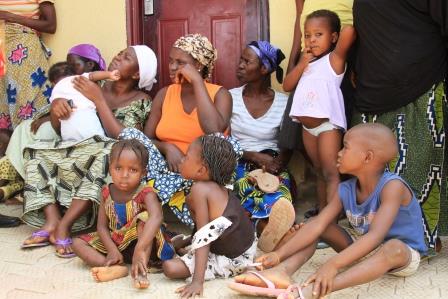While I was in faraway Johannesburg, South Africa last week participating at the 3rd W.H.O/PMNCH forum arguably the most strategic political health advocacy meeting in recent time and of course launching the Africa Health Budget Network to demand for more transparency and accountability in Africa. I received an anonymous mail as follows “Aminu, I want to share these few words anonymously with you. Iam a senior colleague and highly placed in the development community in Nigeria. Your column seems to be the only space critically analysing health issues and calling on political leaders to take action in Nigeria. I must commend your effort, courage and resilient in writing weekly and taken on myriad health issues in Nigeria. Please for the sake of Nigerian children I want you take a look at the immunisation coverage in Nigeria in the recently released National Demographic Health Survey and see for yourself and may be write about it. Wishing you and your paper Daily Trust all the best in this onerous task of engaging policy makers.”
By all intent today I wanted to write about the Johannesburg conference with all the interesting things that happened there but after going through that mail and also reading in detail the 2013 National Demographic Health Survey (NDHS) especially the section of immunisation in Nigeria, I lost appetite and was flabbergasted as to how the health of our children has deteriorated over the last 5 years since the 2008 NDHS. I didn’t only read the 2013, I had to study the 2008 in order to do a better comparison.
My article will be about stating the figures and asking questions focusing more on the governors of the states with the appalling figures. According to the World Health Organisation, a child is considered fully vaccinated if he or she has received a BCG vaccination against tuberculosis; three doses of DPT vaccine to prevent diphtheria, pertussis, and tetanus (DPT); at least three doses of polio vaccine; and one dose of measles vaccine. These vaccinations should be received during the first year of life. In Nigeria, BCG and Polio 0 vaccine should be given at birth, DPT and polio vaccines should be given at approximately 6, 10,and 14 weeks of age. Measles vaccine should be given at or soon after the child reaches nine months of age. It is also recommended that children receive the complete schedule of vaccinations before their first birthday and that the vaccinations be recorded on a health card given to the parents or guardians.
Overall the national average in comparison between 2008 (23%) and 2013 (25.3%) has increased by only 2%. This means only 25% of targeted children were fully immunised. 2% increase in 5 years is poor considering the billions of naira expended in immunisation programmes and project by domestic and international donor funds. It is important for us to take a step back and review our interventions with a view to understand what was working and what wasn’t working well and how best we can reinvigorate efforts.
Both the 2008 and 2013 survey have shown that the biggest problem of coverage were found in Northern Nigeria. The pattern is the same for both the 2008 and 2013 surveys which have shown that the biggest problem of coverage were found in Northeast and Northwest. Northwest had 6% and 9.6% coverage in 2008 and 2013 respectively while the northeast has 7.8% and 14.2% coverage in 2008 and 2013 respectively. The worst state in Nigeria is located in Northwest which was Sokoto with 1.4% immunisation coverage in 2013. It means only 1.4 % of the targeted children for immunisation were fully covered. I hope the new current Minister of State for Health who is from the state, Governor Wammako and his commissioner of health are aware of this scandalous poor record?
The states that bordered Sokoto States did also poorly with Kebbi 2.8% and Zamfara 2.1%. Are the governors of these 2 states aware of this development? Are they briefed by their commissioners of health and informed them about the implication for the survival of children? Another state that didn’t do well in the Northwest was Jigawa States with 3.6% coverage.
Looking at Northeast: Yobe, Bauchi and Borno have performed poorly in 2013 survey with 6.9%, 6.1% and 9.7% respectively. Are the governors of these 2 states aware of this development? Are they briefed by their commissioners of health and informed them about the implication for the survival of children?
This poor data is a clarion call for the sitting governors to call for emergency health meetings and review performance and ask the hard questions of what was going wrong and what could be done to redress the issue.
Is Nigeria part of the ‘A PROMISE RENEWED’ which is a global movement to end preventable child deaths? I want to assume the answer is yes. What are the 2 Ministers of Health and the executive secretary of the National Primary Health Care Development Agency doing about this appalling immunisation coverage figure? Are they comfortable with this level of progress?
Under the banner of Committing to Child Survival: A Promise Renewed (APR) 176 governments including Nigeria signed a pledge, vowing toaccelerate progress on child survival. Each pledge representsa serious political commitment to save children from dying of preventable causes. Under the stewardship of the Government of Ethiopia, more than 20 sub-saharan African leaders reaffirm their collective commitment to reduce under-five mortality rates to less than 20 deaths per 1,000 live births by 2035. Indeed the NDHS 2013 immunisation coverage is a slap on Nigeria as one of the countries that signed the APR.
This article was 1st published in Daily Trust Newspaper of 8th July 2014 by Dr Aminu Magashi ( healthweekly@yahoo.com)




